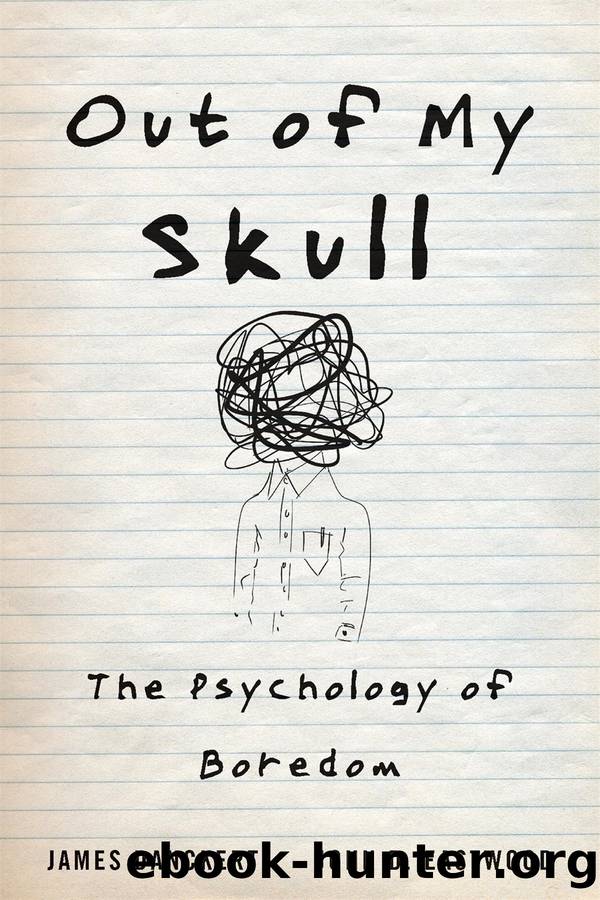Out of My Skull: The Psychology of Boredom by James Danckert & John D. Eastwood

Author:James Danckert & John D. Eastwood [Danckert, James & Eastwood, John D.]
Language: eng
Format: epub
ISBN: 9780674984677
Google: fjHXDwAAQBAJ
Amazon: 0674984676
Publisher: Harvard University Press
Published: 2020-06-08T23:00:00+00:00
Sorting Signal from Noise
Klapp would suggest that it is the lack of information that makes monotony boring. Monotonous circumstances by their definition contain little to no new information, and humans, according to this account, have an inherent need to seek new information. This is not sensation seeking in the sense of the adrenalin junkie’s need for thrills but a curiosity driven by the need for discovery. But what if there is too much variety? Here, according to Klapp, we are unable to extract a meaningful signal from the noise. As the ticker tape of news items scrolls across the bottom of the screen, a talking head tells us about a specific story. Insets to the right show changing traffic conditions on the major highways of our city plus weather forecasts at hourly intervals. How are we to make sense of the sheer onslaught of information? Boredom may well be one outcome of the imposing wall of information we encounter every day. As Klapp puts it, boredom “arises when [the] pace gets faster, change lacks meaning, and movement lacks arrival.”3 Things are constantly happening, but we struggle to make sense of them. And it is certainly true that the ease of access to information in our age at least gives the impression that things are changing at an ever-increasing rate.
So at both ends of this information spectrum—too little or too much—we have a crisis of meaning (Chapter 7). With too little information to satisfy and with little to no change from one moment to the next, things become unbearably monotonous. With too much information to wade through we may feel like we’re constantly in motion—from one tweet to the next, from one funny cat video to the next, from one so-called “breaking” news story to the next—without ever pausing to figure out what, if anything, all of this information means to us.
This account of boredom as a function of information overload in a modern age casts the experience in terms of our need to discover and make meaning, and in so doing, express our agency. Not all repetition is bad. Familiarity anchors our understanding. We find a piece of music intriguing when it plays with our expectations—it is at the same time both familiar and surprising. Similarly, not all variety is good. A Schoenberg symphony is chaotic and impenetrable to someone unfamiliar with atonal music. Extreme redundancy and extreme variety both prevent us from getting an intellectual foothold so that we can perceive something new and meaningful. Optimal engagement then depends on finding a balance between repetition and variety—yet another kind of Goldilocks zone. In this context, boredom functions as a signal that mediates the oscillation between redundancy and variety. This fits with our claim that the boredom signal is not itself problematic. It is how we respond to it that leads to positive or negative outcomes. It also suggests that the highly boredom-prone individual lives at the extremes of information processing—either mired in monotony or overwhelmed by novelty—in either case unable to find the “just right” zone.
Download
This site does not store any files on its server. We only index and link to content provided by other sites. Please contact the content providers to delete copyright contents if any and email us, we'll remove relevant links or contents immediately.
When Breath Becomes Air by Paul Kalanithi(7251)
Why We Sleep: Unlocking the Power of Sleep and Dreams by Matthew Walker(5633)
Paper Towns by Green John(4162)
The Immortal Life of Henrietta Lacks by Rebecca Skloot(3816)
The Sports Rules Book by Human Kinetics(3579)
Dynamic Alignment Through Imagery by Eric Franklin(3481)
ACSM's Complete Guide to Fitness & Health by ACSM(3459)
Kaplan MCAT Organic Chemistry Review: Created for MCAT 2015 (Kaplan Test Prep) by Kaplan(3418)
Introduction to Kinesiology by Shirl J. Hoffman(3297)
Livewired by David Eagleman(3113)
The River of Consciousness by Oliver Sacks(2988)
Alchemy and Alchemists by C. J. S. Thompson(2905)
The Death of the Heart by Elizabeth Bowen(2894)
Descartes' Error by Antonio Damasio(2726)
Bad Pharma by Ben Goldacre(2720)
The Gene: An Intimate History by Siddhartha Mukherjee(2485)
Kaplan MCAT Behavioral Sciences Review: Created for MCAT 2015 (Kaplan Test Prep) by Kaplan(2483)
The Fate of Rome: Climate, Disease, and the End of an Empire (The Princeton History of the Ancient World) by Kyle Harper(2428)
The Emperor of All Maladies: A Biography of Cancer by Siddhartha Mukherjee(2426)
